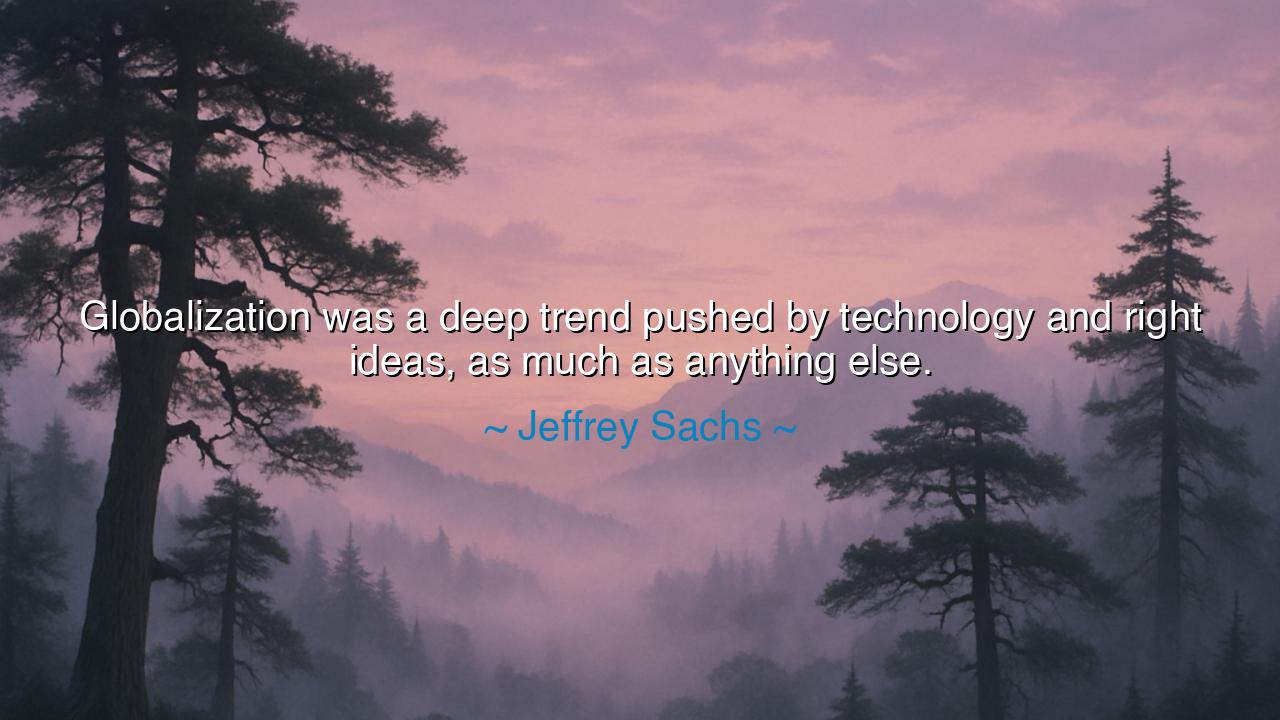
Globalization was a deep trend pushed by technology and right
Globalization was a deep trend pushed by technology and right ideas, as much as anything else.






The wise words of Jeffrey Sachs echo across the ages: “Globalization was a deep trend pushed by technology and right ideas, as much as anything else.” Let us sit with these words, for they are not the fleeting speech of a passing day, but the testimony of history itself. Globalization is not the mere traffic of ships, nor the crossing of merchants upon seas, nor the exchange of silver for silk. It is a current, as deep and inevitable as a river flowing to the ocean, carried forward by the twin forces of technology and ideas—forces that are older than kingdoms, and stronger than armies.
In the ancient days, when humankind first struck fire from stone, technology was born. The wheel turned, the plow dug, the sail caught the wind, and with each creation, borders weakened, and peoples mingled. Yet the wheel alone could not bring about the union of nations. It required also the ideas—the shared belief that knowledge is not bound by tribe, and that wisdom grows when given, not when hoarded. Thus, Sachs reminds us that it was not conquest nor greed alone that carried globalization forward, but the deeper weaving of invention and thought, which pushed humanity beyond its solitude.
Consider the story of the Silk Road, that great artery of civilization. It was not only the caravans of silk and spice that crossed those deserts, but also the ideas of philosophers, the healing arts of physicians, and the spark of religions that would shape nations. Technology made this path possible: the compass, the stirrup, the maps drawn by careful hands. But it was the right ideas—curiosity, trust in trade, respect for the other—that allowed this great network to endure for centuries. Without these guiding lights, the roads would have turned to dust, and the bridges would have fallen into silence.
In more recent times, reflect upon the birth of the internet. Here is technology of unparalleled reach, yet it would have been nothing but empty wires had the idea of connection not taken root in the human spirit. The dream of a world where knowledge belongs to all, where voices can speak across continents in the blink of an eye—this was the idea that gave life to the machine. From the heart of one invention and the mind of one idea came the globalization of thought, commerce, and culture that now defines our age.
Yet, let us not be naïve, children of tomorrow. Globalization is no gentle stream only; it is a tide that can nourish or destroy. When guided by wisdom, it lifts nations out of poverty, spreads the cures of physicians, and reveals the beauty of distant cultures. But when enslaved to greed, it brings exploitation, widens the gulf between rich and poor, and silences the weak. Sachs’s words remind us that it is not fate alone that drives this tide, but our choices—what technologies we create, and which ideas we choose to elevate.
So what lesson lies here for the seeker of wisdom? It is this: do not fear the vastness of the world, for the rivers of humanity have always flowed together. Instead, ask yourself—what technologies shall I use, and what ideas shall I serve? Will you wield the tools of this age to divide, or to unite? Will your thoughts be walls, or bridges? For the fate of globalization is not the work of kings alone, but the daily choice of every hand that builds, and every voice that speaks.
Let your actions be as follows: embrace curiosity, seek out voices unlike your own, learn the crafts of this modern world, and wield them with compassion. Do not shrink from the tools of technology, for they are but stones awaiting the mason. Instead, anchor them in the right ideas—justice, dignity, and fellowship. In this way, you will not merely be swept along by the tide of globalization, but will stand as one who guides its waters toward the fertile plains of peace.
Thus remember, O listener: the world grows closer not only by the engines of men, but by the spirit that dwells within them. And the legacy of globalization shall not be counted in riches nor in empires, but in the measure of how we used our tools, and in the nobility of the ideas we chose to serve.






AAdministratorAdministrator
Welcome, honored guests. Please leave a comment, we will respond soon